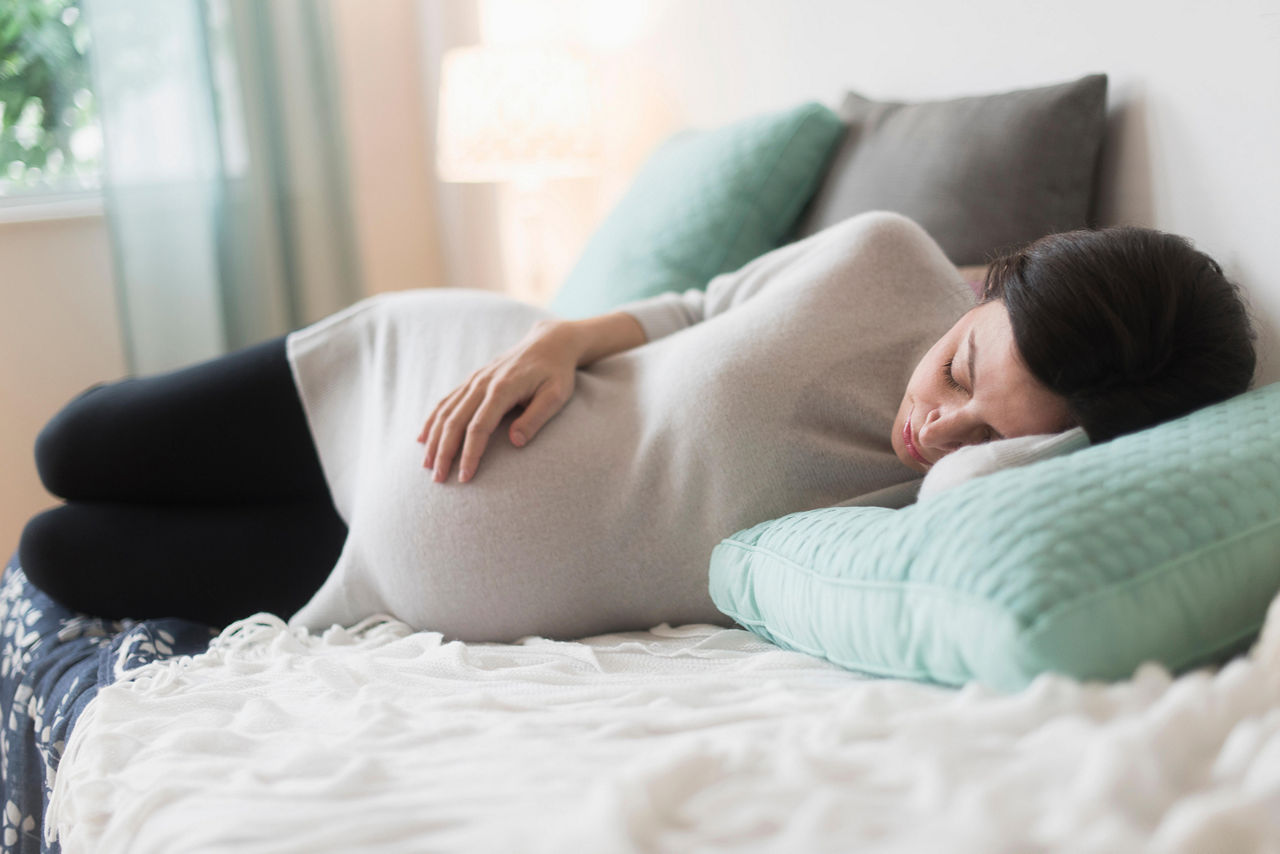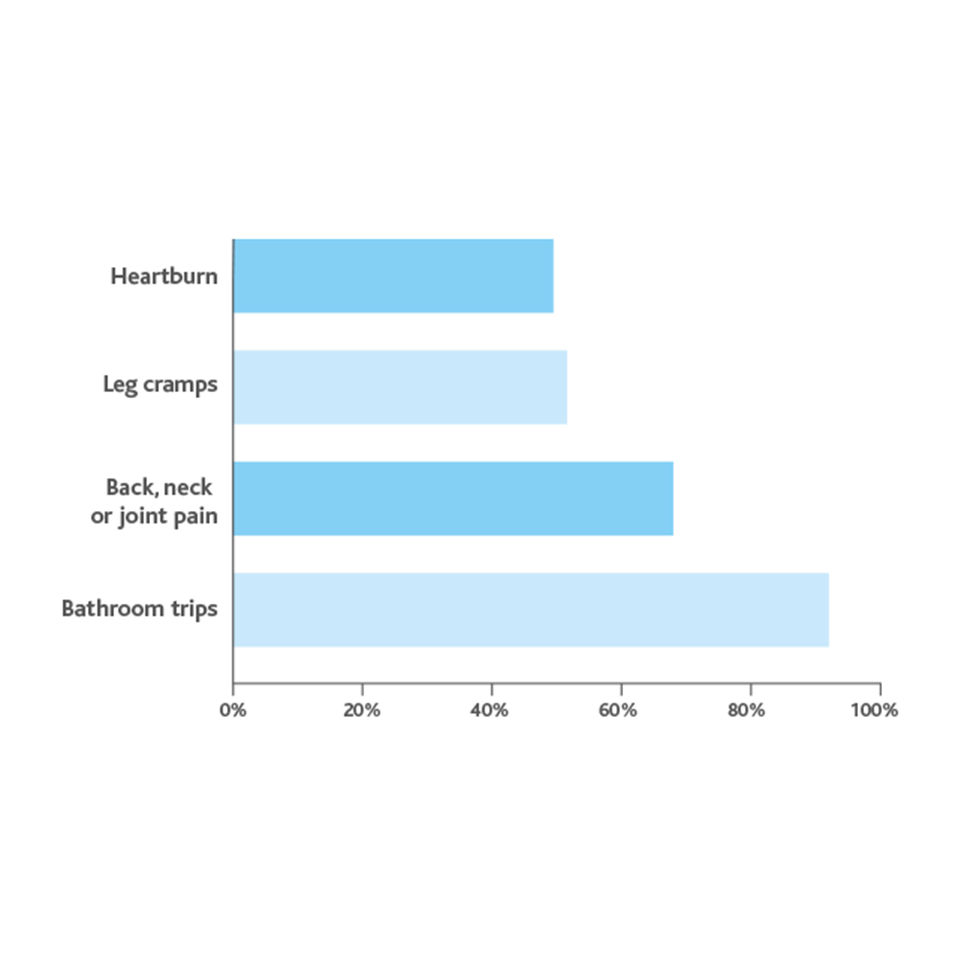It’s estimated that we spend a third of our lives sleeping; the recommended 7-9 hours a night1 gives our bodies and brains the chance to rest and recuperate. Yet during pregnancy a good night’s sleep can be hard to come by. Read about the most common causes of night-time disruption, and the measures you can take to improve your pregnancy sleep.
Your sleep during pregnancy

Pregnancy sleep – what's normal?
Your body is engaged in the incredible feat of growing a new human being. It’s no wonder you feel exhausted. But if you’re not getting the good night’s sleep you desperately need it can make pregnancy feel overwhelming.
It may be some comfort to know that poor pregnancy sleep is experienced by many; in fact, 84% of women experience sleep problems in pregnancy, compared with 67% of women in general2.

Feeling well-rested will mean you have more energy to get through labour and cope with the challenges that come with being a new mum.
Pregnancy sleep – what's normal?
Studies show that even though women tend to sleep more in the first trimester, their sleep is still disturbed. From the second trimester onwards the amount of sleep declines and towards the end of pregnancy women experience more restlessness and broken sleep3. 74% of pregnant women are awake during the night and 46% say they wake too early and can’t get back to sleep2.
What’s waking you?
The most common causes of restlessness and night waking in pregnancy include needing to use the toilet, back, neck or joint pain, leg cramps and heartburn. Vivid dreams and nightmares are also a common complaint, with 42% of women in their second trimester listing them as a cause of disturbance2.
Causes of poor pregnancy sleep in 3rd trimester2
 Percentage of women to have their sleep disturbed by each factors in their third trimester.
Percentage of women to have their sleep disturbed by each factors in their third trimester.
The importance of side-sleeping
You’re advised to sleep on your side during pregnancy, particularly as your pregnancy progresses. A recent study confirmed that the risk of stillbirth doubles when women sleep on their backs in the third trimester4. It’s thought that the weight of your growing bump can put pressure on blood vessels that supply the uterus, restricting blood flow and oxygen to the baby5.
If you’re accustomed to sleeping on your back or front it can be difficult to adjust to this new side-sleeping position. It may even be contributing to your poor sleep. If you’re waking up on your back, don’t worry – the most important thing is the position you fall asleep in, as this is the position held for longest5. Simply roll back on to your side when you can.
Try to lie on your side:
- When you’re going to sleep at night
- When you’re returning to sleep after waking at night
- When you go for a nap
Improving your pregnancy sleep
A better night’s sleep can improve your mood and even your health during pregnancy; one particular study suggests that pregnant women who slept for shorter periods of less than 6 hours had an increased risk of gestational diabetes. Feeling well-rested will mean you have more energy to get through labour and cope with the challenges that come with being a new mum. Find out more about how to lessen pregnancy back, neck or joint pain, leg cramps and heartburn, and improve your sleep during pregnancy.

Need some help?
You can get quick answers to common questions in our FAQs.
Alternatively, if you need help with general pregnancy or baby advice, or maybe on using or ordering our products - our expert team are always on hand to talk about feeding your baby.
1. Sleep Foundation. (2018). How Much Sleep Do We Really Need?. [online] Available at: https://www.sleepfoundation.org/how-sleep-works/how-much-sleep-do-we-really-need [Accessed 14 Feb. 2018].
2. Sleep Foundation. (2007). Summary of Findings. [online] Available at: https://www.sleepfoundation.org/wp-content/uploads/2018/10/NSF_Bedroom_Poll_Report_1.pdf [Accessed 14 Feb. 2018].
3. Hedman, C., Pohjasvaara, T., Tolonen, U., Suhonen-Malm, A. and Myllylä, V. (2018). Effects of pregnancy on mothers' sleep. [online] Available at: http://www.sciencedirect.com/science/article/pii/S1389945701001307 [Accessed 14 Feb. 2018].
4. Tommy's. (2018). Tommy's - Sleep position and stillbirth risk - press release. [online] Available at: https://www.tommys.org/pregnancy-information/im-pregnant/sleep-side/sleep-side-pregnancy-campaign [Accessed 14 Feb. 2018].
5. Reutrakul, S., Anothaisintawee, T., Herring, S., Balserak, B., Marc, I. and Thakkinstian, A. (2018). Short sleep duration and hyperglycemia in pregnancy: Aggregate and individual patient data meta-analysis. [online] Sleep Medicine Reviews. Available at: http://www.smrv-journal.com/article/S1087-0792(16)30140-X/fulltext [Accessed 14 Feb. 2018].
Last reviewed: 25th April 2017
